30 Days of Guidance: Signposts Towards Rectification & Repentance A Short Journey with Sh. al-‘Utheimeen [Exercise Workbook]
$12.00
In stock
Description
All of these questions and answers selected for this course book are from:
Sheikh Muhammad Ibn Saaleh al-‘Utheimeen, may Allaah have mercy upon him.
and have been taken from the twelve volume printing of ‘Fatawaa Nur Alaa Dharb Lil Fadheelatul Sheikh al-‘Allamah Muhammad Ibn Saaleh al-‘Utheimeen’ published by the Sheikh Muhammad Ibn Saaleh al-‘Utheimeen Charitable Foundation in 1434- the first printing.
Translated & Compiled by: Abu Sukhailah Khalil Ibn-Abelahyi al-Amreekee
Download the free PDF preview today – click on the link below:
30 Days of Guidance: Signposts Towards Rectification & Repentance - [Book 3] Preview (2207 downloads )This is the exercise workbook to be used with one of the two study editions.
[Available: NOW¦ pages:150+ ¦ Size: 7.44 x 9.25 soft cover ]
This main course book has 30 daily lessons:
Day 01: How do I work to save myself from Hellfire?
Day 02: What should I do, as my society has a great deal wrongdoing and sinning?
Day 03: How can I understand what taqwa is, and have it in my life?
Day 04: How should I call myself to account as a Muslim?
Day 05: What should be in my heart when I intend to do good?
Day 06: How can I safeguard my intention for Allaah in everything I do?
Day 07: How can I bring myself peace, and build my love for Allaah’s sake?
Day 08: When I feel that my emaan has gone down what should I do?
Day 09: As a Muslim, how can I make my heart steadfast?
Day 10: How can I treat the hardness that I sense in my heart?
Day 11: How can I study and memorize Qur’aan more?
Day 12: How do I keep my mind from being always distracted?
Day 13: How can I deal with the things that affected my practice of Islaam?
Day 14: Should I read the fictional writings of disbelievers?
Day 15: How do I know if I’m spending my time beneficially?
Day 16: How can I stop thinking about the days before I was guided?
Day 17: How can I stop smoking for Allaah’s sake?
Day 18: How to guard my eyesight from what’s harmful around me?
Day 19: How can I change the fact that I’m always thinking about someone?
Day 20: How can I handle still feeling bad for my past mistakes?
Day 21: How can I fight against the whispers that make me doubt things?
Day 22: How do I know if my evil thoughts take me outside Islaam?
Day 23: Do my bad thoughts mean I’m a hypocrite?
Day 24: How can I wipe away the many wrong things that I did in the past?
Day 25: Can I use the money I earned when I was sinful and heedless?
Day 26: How can I correct the previous wrongs that I did to other people?
Day 27: How can I strengthen my practice of Allaah’s religion?
Day 28: How do I know which worldly things I should leave for Allaah’s sake?
Day 29: How can I be a sincere worshiper and traveler in this life?
Day 30: How can I understand the humiliation upon us as Muslims?
Five separate appendixes (in main course book):
Course Appendix 1:
Seven Goals & Objectives Which Are Sought After Through Learning and Affirming The Correct Beliefs Of Islaam
The true basis of rectification of every human being lies in it firstly affirming the correct beliefs about the Creator in order to worship Him alone, and about the creation. This is a brief yet concise explanation of these objectives by the guiding scholar Sheikh Muhammad Ibn Saaleh al-‘Utheimeen, may Allah have mercy upon him
Course Appendix 2:
We Must Take Advantage Of What Remains Of Our Lives, To Return Back To Allaah…
This incredible excerpt from one of the leading scholars alive in our present age, Sheikh Saaleh al-Fauzaan, may Allaah preserve him, was given during a previous Ramadhaan, yet his excellent reminder and admonition serves as excellent encouragement towards rectification for every the striving worshiper inside and outside of that blessed month.
Course Appendix 3:
Benefits Connected to Having Taqwa In this World and the Next
This collection of brief but important points from Sheikh al-‘Utheimeen show us the many benefits that developing and acting upon taqwa as we have been commanded bring to our lives in this world and in the Hereafter.
Course Appendix 4:
Guarding Ourselves & Our Families From The Dangers Within Modern Media
This is an admonition and important reminder from Sheikh Saaleh al-Fauzaan, may Allaah preserve him, about an obligation that many Muslims either overlook or are negligent about regarding their responsibility to control and carefully filter the different influences that enter their homes, whether material, digital, audio, or visual.
Course Appendix 5
An Overview of the Book “High Aspirations Or Goals: Those Matters Which Strengthen It And Those Which Prevent It”
This is the translated introduction and table of contents of a beneficial book from a scholar and reviewed by a major scholar, Sheikh Imaam Ibn Baaz, may Allah have mercy upon him, that can help us understand how to best face the challenge which every Muslim who seeks to better and rectify the shortcomings in their life to live upon the guidance of Islaam. It offers a glimpse into the issue of having high aspirations and goals from the sound balanced perspective of Islaam, giving an overview of what helps and hinders us in this endeavor as Muslims.
This is book three in our 30 Days Series. The importance of this subject has been indicated by many scholars of the Sunnah past and present. The noble scholar Ibn al-Qayyim, may Allaah have mercy upon him, mentioned in his work ‘Madaarij as-Saalikeen’,
“The purification of the self or soul and its becoming rectified is dependent upon it being called to account and assessed. There is no purification or rectification nor any possibility of it being brought to a state of well-being except through calling oneself to account. al-Hasan al-Basree, may Allaah have mercy upon him, said,
“As for the believer, then you do not see him, in other state except as one who steps forth and confronts himself says: Why did I make such and such statement? Why did I eat such and such food? Why did I go to such and such place? What do I do this thing? What did I engage in that matter? By Allaah, I will not fall into that again, and what is similar to these statements. He takes himself to account looking at his shortcomings and deficiencies. So that he has the opportunity to try and fix, and rectify them”
Only logged in customers who have purchased this product may leave a review.
Warning: Undefined array key "show_submission" in /home/taalib/apps/app-taalib/wp-content/plugins/helpie-faq/includes/woo-integrator.php on line 85
You may also like…
-
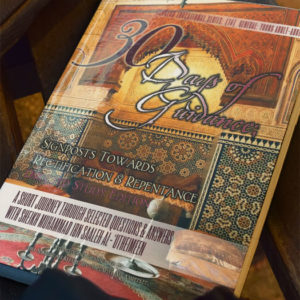
30 Days of Guidance: Signposts Towards Rectification & Repentance A Short Journey with Sh. al-‘Utheimeen [Directed Study Edition]
$25.00 Add to cart -
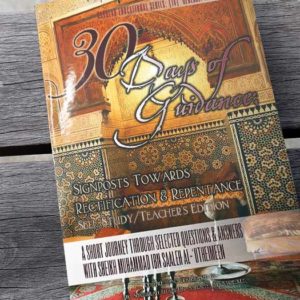
30 Days of Guidance: Signposts Towards Rectification & Repentance A Short Journey with Sh. al-‘Utheimeen [Self-Study/Teacher’s Edition]
$27.50 Add to cart



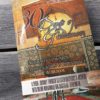




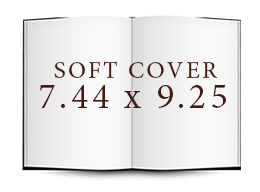

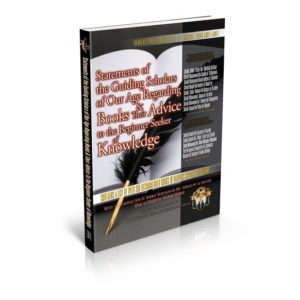

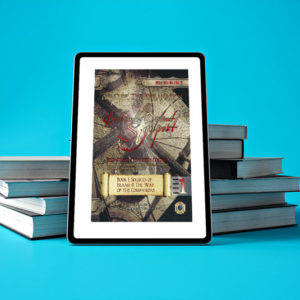
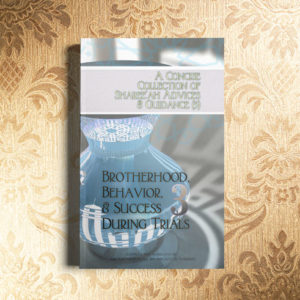

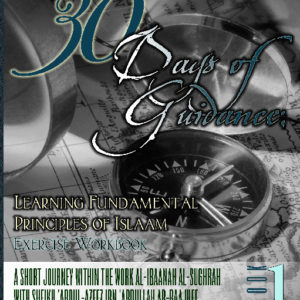

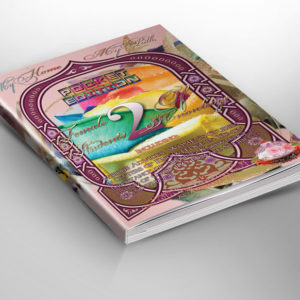
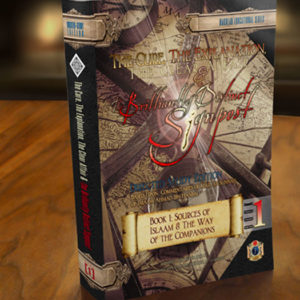
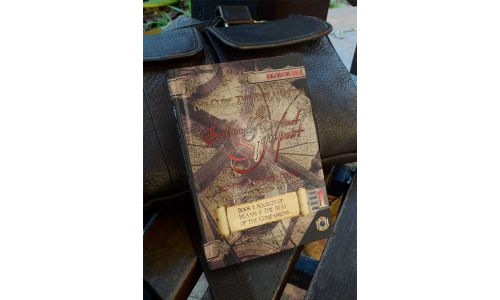
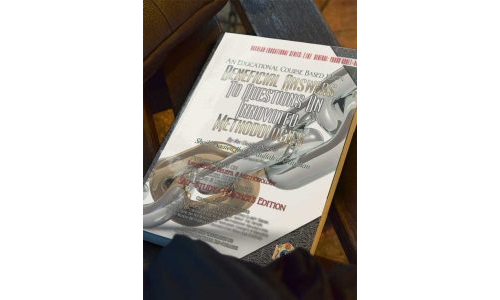
![30 Days of Guidance: Signposts Towards Rectification & Repentance - [Book 3] Preview](https://taalib.com/wp-content/uploads/wpdm-cache/1book-whereisyourlife-1024-500x300.jpg)

Reviews
There are no reviews yet.